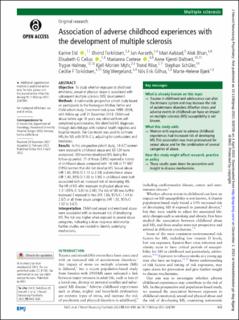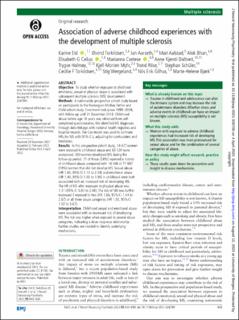| dc.contributor.author | Eid, Karine | |
| dc.contributor.author | Torkildsen, Øivind | |
| dc.contributor.author | Aarseth, Jan Harald | |
| dc.contributor.author | Aalstad, Mari | |
| dc.contributor.author | Bhan, Alok | |
| dc.contributor.author | Celius, Elisabeth Gulowsen | |
| dc.contributor.author | Cortese, Marianna | |
| dc.contributor.author | Daltveit, Anne Kjersti Nesje | |
| dc.contributor.author | Holmøy, Trygve | |
| dc.contributor.author | Myhr, Kjell-Morten | |
| dc.contributor.author | Riise, Trond | |
| dc.contributor.author | Schuler, Stephan | |
| dc.contributor.author | Torkildsen, Cecilie Fredvik | |
| dc.contributor.author | Wergeland, Stig | |
| dc.contributor.author | Gilhus, Nils Erik | |
| dc.contributor.author | Bjørk, Marte-Helene | |
| dc.date.accessioned | 2022-12-14T08:05:51Z | |
| dc.date.available | 2022-12-14T08:05:51Z | |
| dc.date.created | 2022-05-13T12:40:57Z | |
| dc.date.issued | 2022 | |
| dc.identifier.citation | Journal of Neurology, Neurosurgery and Psychiatry. 2022, 93 (6), 645-650. | |
| dc.identifier.issn | 0022-3050 | |
| dc.identifier.uri | https://hdl.handle.net/11250/3037596 | |
| dc.description.abstract | Objective: To study whether exposure to childhood emotional, sexual or physical abuse is associated with subsequent multiple sclerosis (MS) development. Methods: A nationwide, prospective cohort study based on participants in the Norwegian Mother, Father and Child cohort study. Enrolment took place 1999-2008, with follow-up until 31 December 2018. Childhood abuse before age 18 years was obtained from self-completed questionnaires. We identified MS diagnoses through data-linkage with national health registries and hospital records. The Cox model was used to estimate HRs for MS with 95% CIs, adjusting for confounders and mediators. Results: In this prospective cohort study, 14 477 women were exposed to childhood abuse and 63 520 were unexposed. 300 women developed MS during the follow-up period. 71 of these (24%) reported a history of childhood abuse, compared with 14 406 of 77 697 (19%) women that did not develop MS. Sexual abuse (HR 1.65, 95% CI 1.13 to 2.39) and emotional abuse (HR 1.40, 95% CI 1.03 to 1.90) in childhood were both associated with an increased risk of developing MS. The HR of MS after exposure to physical abuse was 1.31 (95% CI 0.83 to 2.06). The risk of MS was further increased if exposed to two (HR 1.66, 95% CI 1.04 to 2.67) or all three abuse categories (HR 1.93, 95% CI 1.02 to 3.67). Interpretation: Childhood sexual and emotional abuse were associated with an increased risk of developing MS. The risk was higher when exposed to several abuse categories, indicating a dose-response relationship. Further studies are needed to identify underlying mechanisms. Keywords: multiple sclerosis; trauma, psychol seque. © Author(s) (or their employer(s)) 2022. Re-use permitted under CC BY-NC. No commercial re-use. See rights and permissions. Published by BMJ. | |
| dc.language.iso | eng | |
| dc.title | Association of adverse childhood experiences with the development of multiple sclerosis | |
| dc.title.alternative | Association of adverse childhood experiences with the development of multiple sclerosis | |
| dc.type | Peer reviewed | |
| dc.type | Journal article | |
| dc.description.version | publishedVersion | |
| dc.description.version | publishedVersion | |
| dc.source.pagenumber | 645-650 | |
| dc.source.volume | 93 | |
| dc.source.journal | Journal of Neurology, Neurosurgery and Psychiatry | |
| dc.source.issue | 6 | |
| dc.identifier.doi | 10.1136/jnnp-2021-328700 | |
| dc.identifier.cristin | 2024330 | |
| dc.relation.project | Norges forskningsråd: 288164 | |
| dc.relation.project | Helse Vest RHF: F-12503 | |
| cristin.ispublished | true | |
| cristin.fulltext | original | |
| cristin.fulltext | original | |
| cristin.qualitycode | 2 | |

